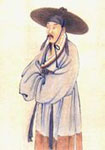“歲晚悲辛利州路”的意思及全詩出處和翻譯賞析
“歲晚悲辛利州路”全詩
當車礧礧石如屋,百里夷途無十步。
溪橋缺斷水嚙沙,崖腹崩頹風拔樹。
虎狼妥尾擇肉食,狐貍豎毛啼日暮。
冢丘短草聲窸窣,往往精靈與人遇。
我生胡為忽在此?正坐一饑忘百慮。
五更出門寒裂面,半夜燎衣泥滿褲。
妻孥八月離夔州,寄書未到今何處?余年有幾百憂集,日夜朱顏不如故。
即今臺省盛諸賢,細思寧是儒冠誤!
分類:
作者簡介(陸游)

陸游(1125—1210),字務觀,號放翁。漢族,越州山陰(今浙江紹興)人,南宋著名詩人。少時受家庭愛國思想熏陶,高宗時應禮部試,為秦檜所黜。孝宗時賜進士出身。中年入蜀,投身軍旅生活,官至寶章閣待制。晚年退居家鄉。創作詩歌今存九千多首,內容極為豐富。著有《劍南詩稿》、《渭南文集》、《南唐書》、《老學庵筆記》等。
《木瓜舖短歌》陸游 翻譯、賞析和詩意
《木瓜舖短歌》是宋代陸游創作的一首詩詞。以下是這首詩詞的中文譯文、詩意和賞析:
鼓樓坡前木瓜舖,
In front of the Drum Tower slope, there's a wooden stall selling papayas,
歲晚悲辛利州路。
Late in the year, I lament the hardships of the road to Lizhou.
當車礧礧石如屋,
The carriage moves slowly, the stones are like houses,
百里夷途無十步。
A hundred miles of rugged road, not a single step is smooth.
溪橋缺斷水嚙沙,
The creek bridge is broken, the water gnaws at the sand,
崖腹崩頹風拔樹。
The cliff's belly crumbles, the wind uproots trees.
虎狼妥尾擇肉食,
Tigers and wolves lurk, choosing their prey,
狐貍豎毛啼日暮。
Foxes raise their fur, crying at dusk.
冢丘短草聲窸窣,
The tomb mounds have short grass, rustling with sound,
往往精靈與人遇。
Often, spirits and humans meet.
我生胡為忽在此?
Why was I born to be here in this place?
正坐一饑忘百慮。
Sitting here hungry, forgetting all worries.
五更出門寒裂面,
At the fifth watch, I leave home, my face cracked with cold,
半夜燎衣泥滿褲。
In the middle of the night, my clothes are scorched, my pants covered in mud.
妻孥八月離夔州,
In the eighth month, my wife and children left Kuizhou,
寄書未到今何處?
Where are the letters they sent, which have not yet arrived?
余年有幾百憂集,
I have accumulated hundreds of worries over the years,
日夜朱顏不如故。
Day and night, my youthful appearance is no longer the same.
即今臺省盛諸賢,
Nowadays, the government is filled with many talented officials,
細思寧是儒冠誤!
Upon careful reflection, it seems that the Confucian cap has been misused!
這首詩詞以描繪旅途中的艱辛為主題,表達了作者對途中困難和痛苦的感受。詩中描繪了道路崎嶇、橋梁破損、自然環境惡劣等景象,以及野獸的威脅和孤獨感。作者通過自問自答的方式,表達了對自己生活處境的疑惑和不滿。他感嘆自己的憂愁積累已有幾百年之久,而年華已逝,容顏不再。最后,作者對當時政府中的士人們的表現表示質疑,認為他們誤用了儒冠,沒有真正履行儒家思想所倡導的仁義道德。
這首詩詞通過描繪旅途中的困苦和對社會現實的反思,表達了作者內心的痛苦和對時代的不滿。它展示了陸游對社會現實的敏銳觀察和對人生意義的思考,同時也反映了宋代社會的一些問題和不公。整體上,這首詩詞以其深刻的描寫和思考,展現了陸游獨特的詩人才華和對人生的思索。
“歲晚悲辛利州路”全詩拼音讀音對照參考
mù guā pù duǎn gē
木瓜舖短歌
gǔ lóu pō qián mù guā pù, suì wǎn bēi xīn lì zhōu lù.
鼓樓坡前木瓜舖,歲晚悲辛利州路。
dāng chē léi léi shí rú wū, bǎi lǐ yí tú wú shí bù.
當車礧礧石如屋,百里夷途無十步。
xī qiáo quē duàn shuǐ niè shā, yá fù bēng tuí fēng bá shù.
溪橋缺斷水嚙沙,崖腹崩頹風拔樹。
hǔ láng tuǒ wěi zé ròu shí, hú lí shù máo tí rì mù.
虎狼妥尾擇肉食,狐貍豎毛啼日暮。
zhǒng qiū duǎn cǎo shēng xī sū, wǎng wǎng jīng líng yú rén yù.
冢丘短草聲窸窣,往往精靈與人遇。
wǒ shēng hú wéi hū zài cǐ? zhèng zuò yī jī wàng bǎi lǜ.
我生胡為忽在此?正坐一饑忘百慮。
wǔ gēng chū mén hán liè miàn, bàn yè liáo yī ní mǎn kù.
五更出門寒裂面,半夜燎衣泥滿褲。
qī nú bā yuè lí kuí zhōu, jì shū wèi dào jīn hé chǔ? yú nián yǒu jǐ bǎi yōu jí, rì yè zhū yán bù rú gù.
妻孥八月離夔州,寄書未到今何處?余年有幾百憂集,日夜朱顏不如故。
jí jīn tái shěng shèng zhū xián, xì sī níng shì rú guān wù!
即今臺省盛諸賢,細思寧是儒冠誤!
“歲晚悲辛利州路”平仄韻腳
平仄:仄仄平平仄平仄
韻腳:(仄韻) 去聲七遇 * 平仄拼音來自網絡,僅供參考;詩句韻腳有多個的時候,對比全詩即可判斷。